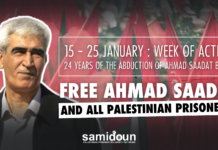 Samidoun Palestinian Prisoner Solidarity Network salutes the initiators of this conference and we look forward to joining them in struggle, and in Madrid in 2021! For more information, please see https://masarbadil.org/
Samidoun Palestinian Prisoner Solidarity Network salutes the initiators of this conference and we look forward to joining them in struggle, and in Madrid in 2021! For more information, please see https://masarbadil.org/
Palestinian organizers and associations in occupied Palestine and the diaspora issued a call on Monday, 2 November, marking the 103rd anniversary of the Balfour declaration. They announced the launch of planning and preparations for the “Conference for the Alternative Palestinian Path,” to be convened in Madrid, Spain, at the end of October 2021, in one year’s time.
In the call for participation in the conference, which will coincide with the 30th anniversary of the so-called “Madrid Peace Conference” in 1991 – the event that laid the path to Oslo – they say:
“We call on the masses of our Palestinian people, and all student, youth and women’s organizations and movements, and civil and popular institutions throughout the diaspora, for unity, cooperation and active participation in launching the widest popular, Palestinian, Arab and international movement, that breaks with the constraints of the previous phase and the Madrid-Oslo approach, and establishes a news stage of struggle, through broad popular participation in the “All of Palestine Conference, All of the Palestinian People, All Palestinian Rights … The Alternative National, Popular and Democratic Conference.”
Reports about the organizing noted that “the organizers who are participating in this project, the early announcement of the conference and the documents that have so far been published all are positive elements that herald a new Palestinian movement, building on a mass, popular basis and outside the expected context, that can stir the stagnant waters in Palestinian politics and create a necessary dialogue, which we hope will go beyond the traditional discourse of Palestinian forces and the repeated talk of elections and rounds of reconciliation talks.”
The Madrid Peace Conference, held at the end of October and early November 1991, was the first major public occasion that brought together almost all Arab countries with Israel under U.S. and Russian (shortly following the dismantlement of the Soviet Union) sponsorship. This marked a fast track to normalization and the official, public Arab rupture with the “three No’s” of Khartoum after the 1967 aggression: “No reconciliation, no negotiation and no recognition.”
Preparatory committee members said, “The time has come for the Palestinian people to free their voice and their national cause from the grip and domination of the path of Madrid and Oslo. The basic elements for the success of this popular initiative lie in the breadth and depth of youth and student participation and the involvement of activists and organizations from all regions and conferences, to provide a positive atmosphere for this work. Through national action and responsible dialogue, the right of all is secured to participate in directing the future of the conference.”
They noted further that “what is important is after the conference, not just before it,” emphasizing that “the conference itself is not our goal. What we want is a radical change in the entire course of Palestinian politics that reflects the Palestinian popular will.”
They said, “We want to knock on the walls of the tank, in the famous metaphor of Ghassan Kanafani, and pose the right questions that require a collective answer. No progress may be made on the Palestinian internal front in order to strengthen our movement to confront Zionism, imperialism and colonialism without ensuring the full participation of people and breaking the silence. This cause has a compass, owners and one reliable reference — the Palestinian people.”
From the call to the conference:
“The Palestinian people, who re-established the Palestine Liberation Organization and all its institutions, launched a popular and armed historical revolution in the 1960s, restored the Palestinian national identity, established the Palestinian National Charter, and assumed their national and national responsibilities, are best able to correct the national, Arab and international compass. They are the most capable of turning the tables on all the enemy forces that participated in the Madrid-Oslo crime, and the most capable of restoring balance to the two wings of the Palestinian national movement, between the homeland and the diaspora, supporting the steadfastness of the popular classes, and directing the target of the Palestinian liberation struggle towards Palestine, all of Palestine, in order to protect the unity of the Palestinian people and their inalienable national rights.”
Visit the conference website:
Discover more from Samidoun: Palestinian Prisoner Solidarity Network
Subscribe to get the latest posts sent to your email.




